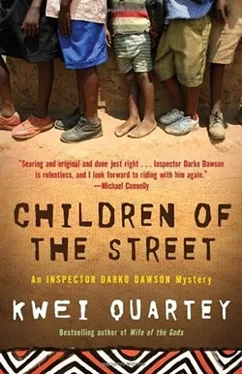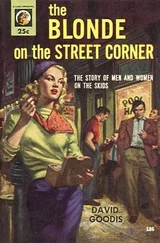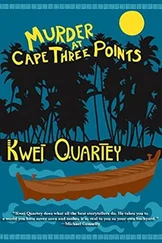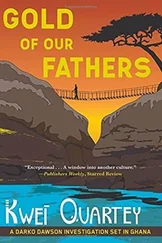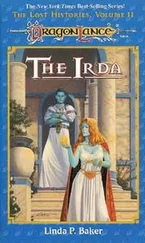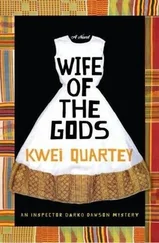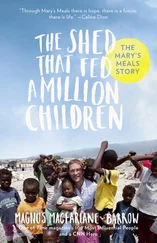
Kwei Quartey
Children of the Street
The second book in the Darko Dawson series, 2011
To all those who dare to care
A day shy of his seventeenth birthday, Musa was a boy with the survival instincts of a grown man. Blood sprang from the stab wound in his back, but he did not die instantly. As his life drained, Musa had a running vision, like a video, of his short life. Life in his small hometown of Gurungu had been a depressing, losing battle as his family tried to grow millet in the unforgivable desert conditions of northern Ghana. It was what had pushed him to his seven-day trek to Ghana’s capital city of smooth motorways and impenetrable traffic jams.
Penniless and lonely, Musa hadn’t known a soul in Accra. With no education, no family connections, and no skills, he could hope for only a few jobs. He could be a street vendor, a luggage porter at a lorry park, a shoeshine boy, or a truck pusher-one of those guys who roams Accra with carts picking up metal scraps to take to the junkyards. He earned much less than a cedi a day.
Up before dawn, Musa never rested until after nightfall, laying his head down on city pavements, at storefronts, and around marketplaces. He had only wanted his life to get better. He had sworn that, after working in Accra for a year, he would go back to Gurungu with new clothes and some money for his mother.
As Musa’s eyelids fluttered closed, he must have wondered if this was what his father had meant when he had shaken a warning finger in Musa’s face. If you go to Accra, you will become nothing but a street child, and you will pay a terrible price for it .
The call had come in on a Sunday morning in June.
“For this one,” Detective Sergeant Chikata had said, “I think they will need us.”
On his Honda motorbike, Detective Inspector Darko Dawson sped by industrial buildings along Ring Road West. The dead body was near the Korle Lagoon. Dawson made it there in fifteen minutes. Even if his eyes had been shut, the pervasive, foul smell of the lagoon would have announced to him that he had arrived.
He turned onto Abossey Okai Road, which formed two bridges, the first of them over the refuse-choked Odaw River, which flowed into the lagoon. Agbogbloshie Market on Dawson’s left and Kokomba Market on his right teemed with Sunday shoppers and hawkers trying to sell everything from bananas to sea crabs.
At the second bridge, over a much smaller channel of tarry, polluted water, there were umbrella-shaded market vendors, pedestrians, trucks, and cars mixed together in organized chaos. Dawson parked and locked his bike. Sprawling onto the riverbanks, a crowd of onlookers overflowed both ends of the bridge. Standing at over six feet, Dawson could see above most people’s heads. Detective Sergeant Chikata and a uniformed man Dawson didn’t know were about a hundred meters up on the south bank of the channel. Framed apocalyptically against dense black smoke billowing from somewhere upstream, Deputy Superintendent Bright and three members of his crime scene team, all in masks, gloves, and galoshes, were moving about knee-deep in the foul mire.
Dawson skirted the mass of the crowd and made his way onto the bank. It was carpeted with litter, much of it plastic bottles discarded without a second’s thought after the contained water had been drunk. The rest of the junk included boxes, tin cans, abandoned clothing, trash bags, pieces of machinery, old tires, coconut husks, and unidentifiable bits of metal and plastic detritus. There was also the kind of human waste Dawson definitely did not want his shoes to touch, some of it exposed, some of it in “flying toilets”-tossed black plastic bags with excrement inside.
The impossibly good-looking Detective Sergeant Chikata, Dawson’s junior in rank in the Criminal Investigations Department (CID) Homicide Division, looked up as Dawson approached.
“Morning, Dawson.”
“Morning, Chikata.”
“Body of a dead male spotted in there this morning.”
“How did we get notified?”
Chikata introduced the bulky, flinty-eyed man next to him. “This is Inspector Agyekum. He was the Korle Bu station officer this morning.”
Agyekum was Detective Inspector Dawson’s rank equivalent, but as a general inspector he wore the standard, heavy, sweltering dark blue uniform of the Ghana Police Service (GPS) in contrast to CID’s plainclothesmen.
“Morning, Inspector.” Dawson shook hands, finishing with the customary mutual finger snap.
“I was starting my shift when a small boy came into the station,” Agyekum took up. “That’s him there with Constable Gyamfi.” He pointed his chin farther along the bank where a police constable stood over a boy of about eight sitting on the ground with his head down and his arms folded tightly across his skinny body.
“Many people saw the body,” Agyekum continued, “but because they fear the police, they just kept quiet. But the boy took it upon himself to run over to the Korle Bu station to report it.”
“He’s a brave young man,” Dawson said, looking over at the boy with approval. “And then?”
“Constable Gyamfi took the report in the station and brought it to me,” Agyekum said, “then the two of us returned with the boy. When I saw the body there, I decided to call the Crime Scene Unit.”
“Very good,” Dawson said. “Thank you.”
Dawson knew Police Constable Gyamfi from a previous case a year ago. He waved at the constable, who smiled and half waved, half saluted in return.
“Mr. Bright says he’s quite sure it’s a homicide,” Chikata said.
“Then it probably is,” Dawson said.
Deputy Superintendent Bright, a trained serologist, was head of the CSU team. His hunches were seldom wrong.
Dawson moved a little closer to the water, which was the color of tar and almost the same consistency. He winced at its relentless stench, but people living within smelling distance were used to it, or maybe just ignored it.
Bright and his two crime scene guys squelched around looking for an unlikely clue. There was so much garbage it would be a miracle if they found anything useful. Only Bright’s relentless thoroughness and commitment to excellence had deemed the search necessary. Others might have simply reeled the corpse in without bothering.
The garbage partially camouflaged the dead body, which was facedown. On casual glance, it could have been mistaken for a big clump of rubbish, and undoubtedly had been.
With glop sucking at his galoshes, Deputy Superintendent Bright joined Dawson and the other two men.
“Morning, Dawson.” His voice sounded like the bass notes of a bassoon. “Please excuse my appearance and odor.”
“Good morning, sir. I admire you for going in there.”
Bright looked down at his soiled outfit with a grimace. “These are the last of our hazardous materials garb, so fortunately or not, I won’t be doing this again for a while.”
“Any findings, sir?” Dawson asked.
“Besides the body? Nothing. Still suspect foul play, however. I know a dumped corpse when I see one. And this one is in terrible shape.”
“When are you bringing it in?”
“We’re almost ready for that now.”
“Can you wait a few minutes? I don’t want the boy to see that.”
“No problem, Dawson.”
“Thank you, sir. It’s good to have you around.” Dawson turned and trotted up the bank.
The boy was still with Police Constable Gyamfi, who was in his mid-twenties but looked so young he could have gone undercover as a high school student. As Dawson approached, Gyamfi’s face lit up with a smile of strong, white teeth-the kind that could snap the top off a beer bottle.
Читать дальше
